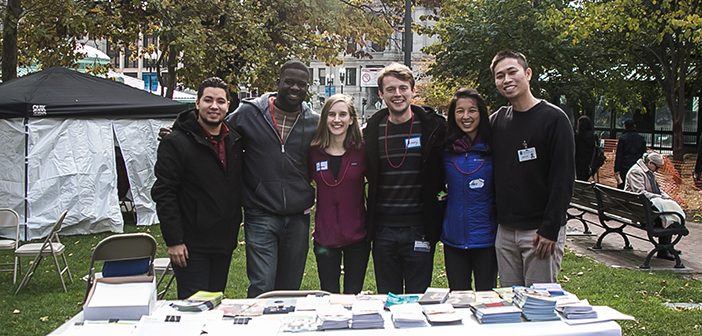Medical students focus on the health care needs of foster youth.
Christian Delacruz bounced in and out of foster care from the day of his birth. When he was 15, his mother signed away her parental rights and he landed in a series of group homes.
Delacruz says he had little access to healthy food or recreational activities at the group homes, and his weight ballooned to 250 pounds. He was prescribed several medications for symptoms related to his obesity. “I got so big I couldn’t breathe when I slept. But instead of a weight loss management program, they had my tonsils taken out,” says Delacruz, referring to his health care providers.
“There is very little coordination of medical and behavioral health services for children in foster care. Less than half of their health care needs are being met,” says Colleen Deems, MSN, CPNP, pediatric nurse practitioner and co-director of the Fostering Health Program at Hasbro Children’s Hospital. While foster children in group homes often have access to visiting providers, she adds, “They do not receive comprehensive medical care in these settings.”
After Delacruz aged out of the foster care system, at 18, he took control of his own health care, throwing out his medications, eating better, and exercising. He dropped to 185 pounds, had more energy, and says he’s healthy. Now 23, he’s a student at the Community College of Rhode Island, works and volunteers for numerous agencies for troubled and foster youth, and advises the Warren Alpert Medical School chapter of Fostering Hope, which prioritizes the health care needs of foster kids.
“Coming from a medical point of view, I think that they’re doing an awesome job and they might be the first [nonprofit in Rhode Island] to bring this kind of voice into that kind of field of work,” Delacruz says.

Austin Tam and Alice Cao founded the Fostering Hope chapter at Warren Alpert Medical School. Photo by Adam Mastoon
Shiliang “Alice” Cao ScM’19 MD’19 and Austin Tam ’15 ScM’19 MD’19, who founded the Fostering Hope chapter at Brown, are particularly concerned about what happens to kids who age out of the foster care system. With no permanent family, these young people are at risk for homelessness, unemployment, poor physical and mental health, food insecurity, and unplanned pregnancy, among other challenges. “I can’t tell you how often I bump into youth I used to live with who are in homeless shelters or are struggling to find food,” Delacruz says.
Cao, who moved frequently throughout her childhood, whenever her father got a new job, says she related to the disruptions that foster youth experience—with one key difference: “I was really lucky to have my family,” Cao says. “Foster youth don’t have anyone stable in their lives.” She began volunteering with foster youth in high school, in California; then, as an undergraduate at Dartmouth, she founded the student organization Fostering Hope.
She decided to start a chapter at Warren Alpert Medical School after meeting Delacruz and finding a like-minded advocate in Tam. The students convened a panel at the Medical School with Deems, Delacruz, and Carol Lewis, MD, clinical associate professor of pediatrics and co-director of the Fostering Health Program. “They were able to talk about [how]toxic stress has an impact on the lives of these foster youth,” Tam says, referring to the frequent moves, abuse, and neglect many foster kids endure.
Delacruz urged the medical students to help him draft a bill, which they hope to introduce in the state legislature, to improve nutrition and access to physical activity in foster care group homes. Deems points out that obesity is not the only diet-related problem foster youth face; she also sees malnutrition, food instability, and disrupted eating patterns. “This is an area where there is great need within the foster care system,” she says.
Fostering Hope members recently submitted written testimony in support of another bill before the state Senate, which would extend foster care to age 21 and provide services to aid their transition to independence, including housing, education, and job training assistance. The Judiciary Committee recommended holding the bill for further study after a hearing on May 9.
The group also is reaching out to Providence’s homeless population. At a downtown health fair organized by medical students last fall, Cao and Tam targeted current and former foster youth with handouts about nutrition, puberty, sexual health, and abuse. Future goals for the group include creating a mentorship program between med students and foster youth and a longitudinal patient navigation experience, in which a student can follow a foster child’s medical care as a health care liaison.
Deems says the most important thing Fostering Hope is doing for Rhode Island is listening to foster youth. “These children are tremendously resilient, but they’re never brought to the table to tell us what they need,” she says. The medical students “have really tried to be on the ground to support them and give them a voice.” Deems adds, “I’ve never before been approached by students doing similar advocacy.”
“I agree with Colleen 100 percent,” Delacruz says. “It means a lot to me as a Rhode Islander.”




